 Immune tolerance (sometimes called immunotolerance or immunological tolerance) is a situation in which the immune system “tolerates” an antigen—meaning that it doesn’t mount an immune response against something that’s capable of inducing one. For example, under normal circumstances, our bodies are tolerant of self-antigens so that our immune system doesn’t attack our own tissues and cells. (When we lose tolerance to self-antigens, autoimmune disease occurs!) Encompassing a range of physiological mechanisms, immune tolerance is why a mother’s body doesn’t attack a fetus, why we can suffer chronic infections, and why we can grow out of allergies. And, immune tolerance is heavily involved in how we react (or don’t react!) to the foods we eat. When it comes to allergenic foods, immune tolerance means that we have no symptoms of a reaction when we consume those foods. With a lack of oral immune tolerance comes food allergy!
Immune tolerance (sometimes called immunotolerance or immunological tolerance) is a situation in which the immune system “tolerates” an antigen—meaning that it doesn’t mount an immune response against something that’s capable of inducing one. For example, under normal circumstances, our bodies are tolerant of self-antigens so that our immune system doesn’t attack our own tissues and cells. (When we lose tolerance to self-antigens, autoimmune disease occurs!) Encompassing a range of physiological mechanisms, immune tolerance is why a mother’s body doesn’t attack a fetus, why we can suffer chronic infections, and why we can grow out of allergies. And, immune tolerance is heavily involved in how we react (or don’t react!) to the foods we eat. When it comes to allergenic foods, immune tolerance means that we have no symptoms of a reaction when we consume those foods. With a lack of oral immune tolerance comes food allergy!
Table of Contents[Hide][Show]
Immune tolerance during childhood is a particularly hot topic. Many of us have heard from medical professionals that it’s important to feed our babies the most common allergenic foods (typically wheat, fish, shellfish, peanuts, tree nuts, dairy, eggs, and soy), under the belief that introducing these foods early on will increase the odds of developing an immune tolerance to them. But, is this advice sound? Does it work? And, is immune tolerance even worth it when it comes to foods that aren’t making positive contributions to our diet and health (wheat, I’m looking at you!)? In this post, we’ll look at immune tolerance as it relates to children (don’t worry; adults are up next!).
What Does the Science Say?
A number of studies have been conducted to test the timing of food introduction on subsequent allergy development in children. One of the most recent is called the LEAP study (which stands for Learning Early About Peanut allergy). The LEAP study assessed whether regularly eating peanuts at an early age (4 to 11 months old) in high-risk babies (those with severe eczema and/or egg allergy) could affect the rate of peanut allergy once those kids were 5 years old. Babies were tested for peanut allergy at the beginning of the study and then randomly assigned to either a peanut avoidance group or a peanut consumption group, where they were given at least three peanut-containing meals each week containing a total of 6 grams of peanut protein weekly (the equivalent of about 7.5 dry-roasted peanuts).
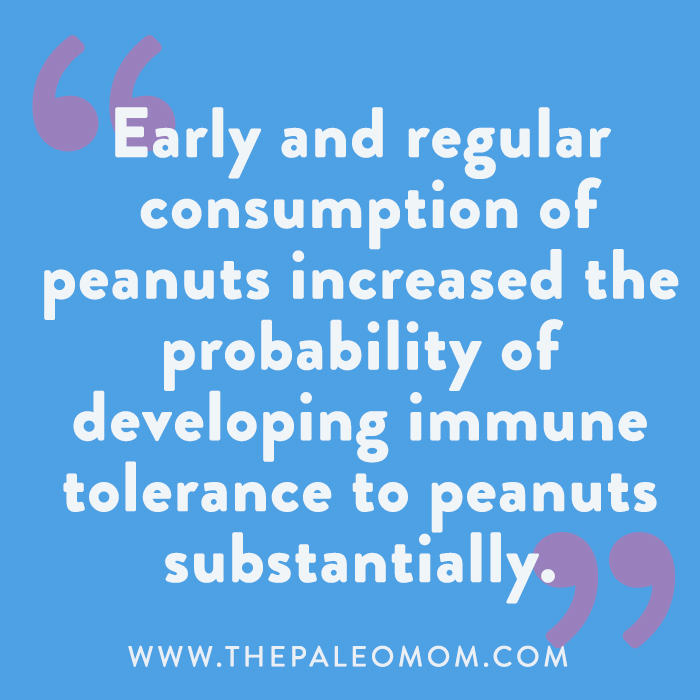 The results were dramatic! In the babies who didn’t test positive for peanut allergy at the beginning of the study, regular peanut consumption was associated with an 86% decrease in peanut allergy at age 5. In the babies who did test positive, regular peanut consumption led to a 70% reduction in peanut allergy at age 5. This means that early and regular consumption of peanuts increased the probability of developing immune tolerance to peanuts substantially. In fact, these results (and supportive data from other studies) have led to a major shift in recommendations for when to introduce allergenic foods to babies, even in those with a high risk of food allergies.
The results were dramatic! In the babies who didn’t test positive for peanut allergy at the beginning of the study, regular peanut consumption was associated with an 86% decrease in peanut allergy at age 5. In the babies who did test positive, regular peanut consumption led to a 70% reduction in peanut allergy at age 5. This means that early and regular consumption of peanuts increased the probability of developing immune tolerance to peanuts substantially. In fact, these results (and supportive data from other studies) have led to a major shift in recommendations for when to introduce allergenic foods to babies, even in those with a high risk of food allergies.
Another compelling result from the LEAP study is that once established, immune tolerance to peanuts persisted even after subsequent avoidance of peanuts for a year. That’s good news, because it means that once established in early life, immune tolerance is not dependent on regular consumption (at least within that one-year time frame)!
Additional studies have found similar results with other common allergens. For example, a randomized controlled trial studied infants who were fed either 1 teaspoon of egg powder (equivalent to 1/6th of an egg) or rice powder (as a control group) on a daily basis between the ages of 4 to 8 months. At the 12-month mark (and excluding the infants who had to discontinue the study due to already-existing egg allergy), the egg group had a lower proportion of infants who had developed an egg allergy (although due to limitations of sample size, the result didn’t reach statistical significance).
Another randomized trial from 2016 also sheds light on the link between first-food introduction timing and subsequent allergy development. In this study, 1303 exclusively breast-fed infants (aged 3 months at the study’s start) were randomly assigned to either a standard-introduction group (exclusive breast-feeding until 6 months of age) or an early-introduction group (where six allergenic foods were introduced: peanut, sesame, wheat, cooked egg, cow’s milk, and fish). The researchers then observed how many children in each group developed allergies to one or more of those foods between the ages of 1 and 3 years. In the per-protocol analysis (looking only at the infants who completed the protocol as planned), 2.4% of the early-introduction group developed food allergies, compared to 7.3% of the standard-introduction group. Those numbers were mostly driven by peanut allergies and egg allergies: none of the between-group differences for milk, sesame, fish, or wheat reached statistical significance.
A systematic review from 2017 looked at the results of 14 different studies on immune tolerance of allergenic foods, found that later introduction of allergenic foods was associated with increased rates of allergy development. Although not all studies are perfectly consistent, on the whole, there’s definitely support that introducing allergenic foods early on is associated with lower allergy development, and waiting until a later age increases the risk.
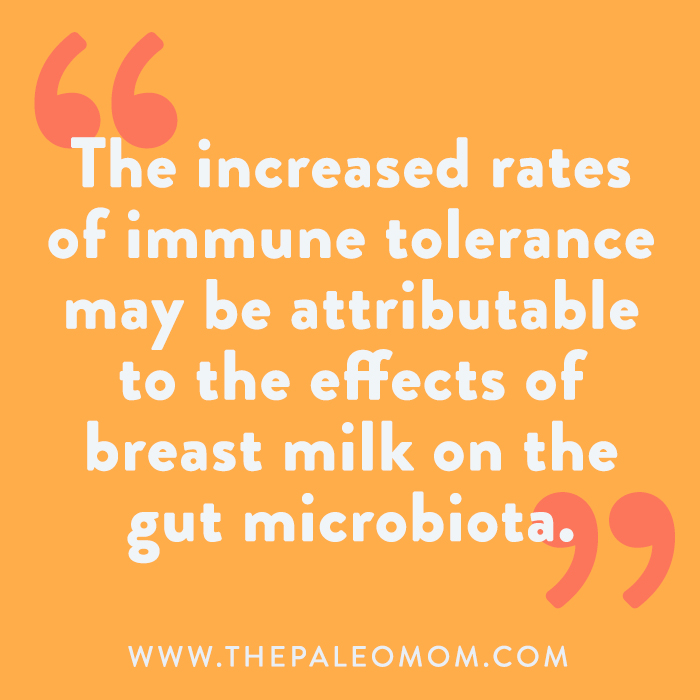 So, does this mean immune tolerance is all about early food introduction? Not so fast! We should note that breastfeeding is a major factor here as well. By shifting the introduction of allergenic foods to a much earlier age, a higher percentage of kids are being exposed to these foods while still breastfeeding. A very recent review (February 2018) highlighted the potential importance of maternal dietary proteins found in amniotic fluid, cord blood, and human milk, which help train the infant’s immune responses to the same types of proteins they encounter from food. And, the increased rates of immune tolerance may be attributable to the effects of breast milk on the gut microbiota. Studies show that breastfeeding is important for the establishment and growth of normal gut microorganisms, and these are important regulators of the immune system. In particular, breast milk contains probiotics, and for the duration of breastfeeding, the guts of babies are being constantly inoculated with these beneficial bacteria!
So, does this mean immune tolerance is all about early food introduction? Not so fast! We should note that breastfeeding is a major factor here as well. By shifting the introduction of allergenic foods to a much earlier age, a higher percentage of kids are being exposed to these foods while still breastfeeding. A very recent review (February 2018) highlighted the potential importance of maternal dietary proteins found in amniotic fluid, cord blood, and human milk, which help train the infant’s immune responses to the same types of proteins they encounter from food. And, the increased rates of immune tolerance may be attributable to the effects of breast milk on the gut microbiota. Studies show that breastfeeding is important for the establishment and growth of normal gut microorganisms, and these are important regulators of the immune system. In particular, breast milk contains probiotics, and for the duration of breastfeeding, the guts of babies are being constantly inoculated with these beneficial bacteria!
As one example of how breastfeeding seems to be an important variable, one study of celiac disease development looked at two cohorts of Swedish 12-year-olds. The first was a group born in 1993 during an epidemic of celiac disease (believed to result from changes in government recommendations for the age of gluten introduction to 6 months old, combined with a concurrent increase in the gluten content of baby foods), and the second was a group born in 1997 after the epidemic (after the government revised the guidelines to lower the age of gluten introduction to 4 months, and the amount of gluten in baby foods was reduced). The study sought to determine the impact of breastfeeding in relation to gluten introduction on the future development of celiac disease.
More than 13,000 children were enrolled in the study. The incidence of celiac disease was 2.8 in 100 in the 1993 cohort, versus 2.2 in 100 in the 1997 cohort. The median age of gluten introduction was the same (5 months old) in both cohorts. The infants in the 1997 cohort were breastfed an average of 2 months longer than the 1993 cohort (the age of weaning increased from an average of 7 months to an average of 9 months between 1993 and 1997). What this means is that the number of babies who were breastfed during and beyond gluten introduction was significantly larger in the 1997 cohort (the number of babies breastfed beyond gluten introduction was 70% in the 1993 cohort versus 78% in the 1997 cohort). From this, the authors concluded that introducing gluten before weaning reduces the risk of celiac disease.
Save 70% Off the AIP Lecture Series!
Learn everything you need to know about the Autoimmune Protocol to regain your health!
I am loving this AIP course and all the information I am receiving. The amount of work you have put into this is amazing and greatly, GREATLY, appreciated. Thank you so much. Taking this course gives me the knowledge I need to understand why my body is doing what it is doing and reinforces my determination to continue along this dietary path to heal it. Invaluable!
Carmen Maier
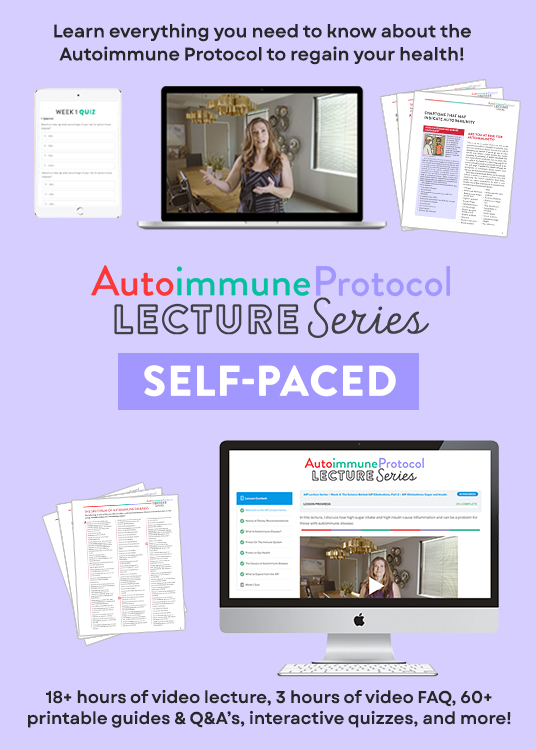
 A number of additional studies have confirmed that breastfeeding may be a key piece in the prevention of celiac disease. A review of four observational studies concluded that breastfeeding during the introduction of gluten was the most important variable in reducing the risk of celiac disease. Another analysis of Swedish children found that among children under the age of 2, risk of celiac disease was reduced by 41% if they were still being breast-fed at the time when dietary gluten was first introduced. The risk of celiac disease dropped by 64% if the breast-feeding continued after the introduction of gluten!
A number of additional studies have confirmed that breastfeeding may be a key piece in the prevention of celiac disease. A review of four observational studies concluded that breastfeeding during the introduction of gluten was the most important variable in reducing the risk of celiac disease. Another analysis of Swedish children found that among children under the age of 2, risk of celiac disease was reduced by 41% if they were still being breast-fed at the time when dietary gluten was first introduced. The risk of celiac disease dropped by 64% if the breast-feeding continued after the introduction of gluten!
These findings still raise the question: is it immunoactive compounds in breast milk or breast milk’s beneficial effects on the gut microbiota that mediate the development of immune tolerance? If breastfeeding is protective because of its probiotic effects, then it could be that it doesn’t matter when allergenic foods are introduced (if ever), as long as the gut is healthy when the introduction occurs. As a matter of fact, the latest research is showing that the microbiota trajectory in infants does show distinct associations with the development of celiac disease after 5-year follow-up (celiac-prone infants have lower bacterial diversity and a lack of increase in Firmicutes families over time, as well as increases in Bifidobacterium breve and Enterococcus spp., whereas infants who don’t develop celiac disease show development of greater bacterial diversity and higher levels of Bifidobacterium longum). We also know that HLA-DQ genotype (determining susceptibility to celiac disease) influences the microbiome composition of infants, with HLA-DQ2 carriers having significantly higher proportions of Firmicutes and Proteobacteria and lower proportions of Actinobacteria compared with non-carriers (and at the genus level, having significantly lower proportions of Bifidobacterium and unclassified Bifidobacteriaceae, and higher proportions of Corynebacterium, Gemella, Clostridium sensu stricto, unclassified Clostridiaceae, unclassified Enterobacteriaceae, and Raoultella). In 2012, the PROFICEL study found that breast-feeding (compared to formula-feeding) reduced the differences in microbiome composition seen between HLA-DQ2/8-carrying infants versus noncarriers (including supplying important species of Bifidobacterium), suggesting that breast-feeding might help normalize the gut microbiome to help prevent celiac disease from developing! More research on this fascinating topic is needed to help us understand the interplay of breast-feeding, microbiota, and intolerance to other allergenic foods.
Is Immune Tolerance Worth It?
Unfortunately, there are still many unanswered questions about promoting immune tolerance to allergenic foods in children. It could be argued that immune tolerance isn’t even desirable if the food in question is empty calories replete with problematic compounds. It could also be argued that the promotion of a healthy gut trumps the introduction of foods that may undermine gut barrier or microbiota health, like gluten-containing grains. And, if we do want to promote immune tolerance to the top eight allergenic foods, a definitive protocol hasn’t been established!
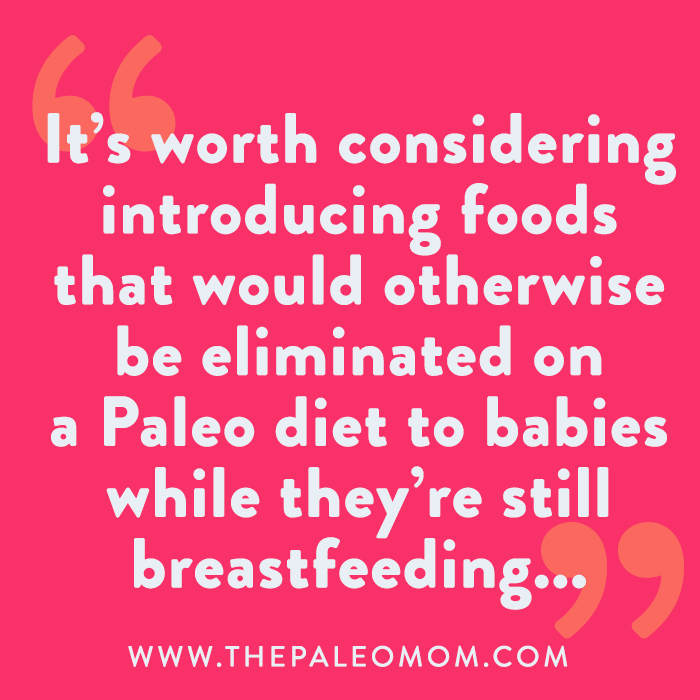 But, it’s worth considering introducing foods that would otherwise be eliminated on a Paleo diet to babies while they’re still breastfeeding and in the context of an otherwise nutrient-dense and anti-inflammatory diet, with a few very small serving per week of those foods with the highest rates of allergy and sensitivity. Developing immune tolerance to common foods could be beneficial to protect against accidental or occasional exposure in life (let’s face it, it’s nearly impossible to have 100% adherence to any particular diet forever!). Because this is an area of active research and few definitive answers, the decision must be an individual one!
But, it’s worth considering introducing foods that would otherwise be eliminated on a Paleo diet to babies while they’re still breastfeeding and in the context of an otherwise nutrient-dense and anti-inflammatory diet, with a few very small serving per week of those foods with the highest rates of allergy and sensitivity. Developing immune tolerance to common foods could be beneficial to protect against accidental or occasional exposure in life (let’s face it, it’s nearly impossible to have 100% adherence to any particular diet forever!). Because this is an area of active research and few definitive answers, the decision must be an individual one!
And that leads us to the question… what about adults?! Can we lose immune tolerance after eliminating allergenic foods for extended periods of time (such as while eating strict Paleo or AIP)? Should we make a special effort to expose ourselves to allergenic foods to avoid a loss of tolerance? Stay tuned for the next post on this topic to find out!
Citations
Akobeng AK, et al. “Effect of breast feeding on risk of coeliac disease: a systematic review and meta-analysis of observational studies.” Arch Dis Child. 2006 Jan;91(1):39-43. Epub 2005 Nov 15.
Barajas MB, et al. “Peanut allergy in Mexican children: what is the effect of age at first consumption?” Iran J Allergy Asthma Immunol. 2016 Feb;15(1):53-61.
Du Toit G, et al. “Randomized trial of peanut consumption in infants at risk for peanut allergy.” N Engl J Med. 2015 Feb 26;372(9):803-13. doi: 10.1056/NEJMoa1414850. Epub 2015 Feb 23.
Du Toit G, et al. “Effect of Avoidance on Peanut Allergy after Early Peanut Consumption.” N Engl J Med. 2016 Apr 14;374(15):1435-43. doi: 10.1056/NEJMoa1514209. Epub 2016 Mar 4.
Henriksson C, et al. “What effect does breastfeeding have on coeliac disease? A systematic review update.” Evid Based Med. 2013 Jun;18(3):98-103. doi: 10.1136/eb-2012-100607. Epub 2012 Aug 4.
Ivarsson A, et al. “Breast-feeding protects against celiac disease.” Am J Clin Nutr. 2002 May;75(5):914-21.
Ivarsson A, et al. “Prevalence of childhood celiac disease and changes in infant feeding.” Pediatrics. Mar 2013;131(3). doi: 10.1542/peds.2012-1015
Jeurink PV, et al. “Importance of maternal diet in the training of the infant’s immune system during gestation and lactation.” Crit Rev Food Sci Nutr. 2018 Feb 2:1-9. doi: 10.1080/10408398.2017.1405907. [Epub ahead of print]
Larson K, et al. “Introducing Allergenic Food into Infants’ Diets: Systematic Review.” MCN Am J Matern Child Nurs. 2017 Mar/Apr;42(2):72-80. doi: 10.1097/NMC.0000000000000313.
Natsume O, et al. “Two-step egg introduction for prevention of egg allergy in high-risk infants with eczema (PETIT): a randomised, double-blind, placebo-controlled trial.” Lancet. 2017 Jan 21;389(10066):276-286. doi: 10.1016/S0140-6736(16)31418-0. Epub 2016 Dec 9.
Olivares M, et al. “Gut microbiota trajectory in early life may predict development of celiac disease.” Microbiome. 2018 Feb 20;6(1):36. doi: 10.1186/s40168-018-0415-6.
Olivares M, et al. “The HLA-DQ2 genotype selects for early intestinal microbiota composition in infants at high risk of developing coeliac disease.” Gut. 2015 Mar;64(3):406-17. doi: 10.1136/gutjnl-2014-306931. Epub 2014 Jun 17.
Palma GD, et al. “Influence of milk-feeding type and genetic risk of developing coeliac disease on intestinal microbiota of infants: the PROFICEL study.” PLoS One. 2012;7(2):e30791. doi: 10.1371/journal.pone.0030791. Epub 2012 Feb 3.
Palmer DJ, et al. “Early regular egg exposure in infants with eczema: A randomized controlled trial.” J Allergy Clin Immunol. 2013 Aug;132(2):387-92.e1. doi: 10.1016/j.jaci.2013.05.002. Epub 2013 Jun 26.
Perkin MR, et al. “Randomized Trial of Introduction of Allergenic Foods in Breast-Fed Infants.” N Engl J Med. 2016 May 5;374(18):1733-43. doi: 10.1056/NEJMoa1514210. Epub 2016 Mar 4.

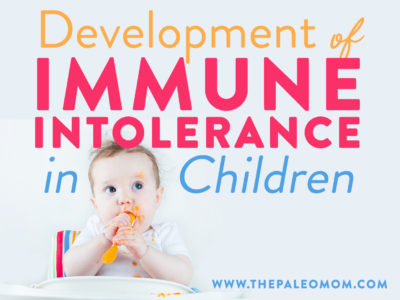
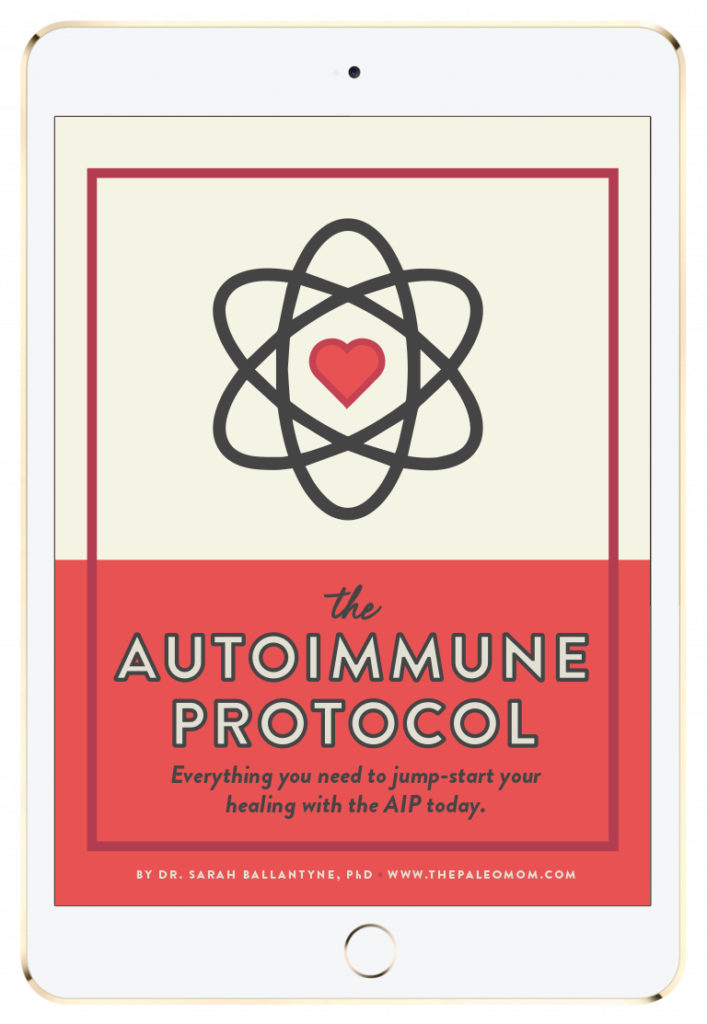

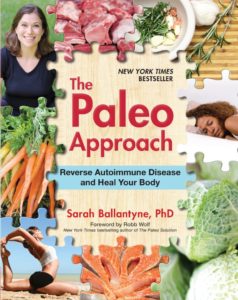
 TPV Podcast, Episode 300: How Do You Handle Sugar and Salt Cravings?
TPV Podcast, Episode 300: How Do You Handle Sugar and Salt Cravings?